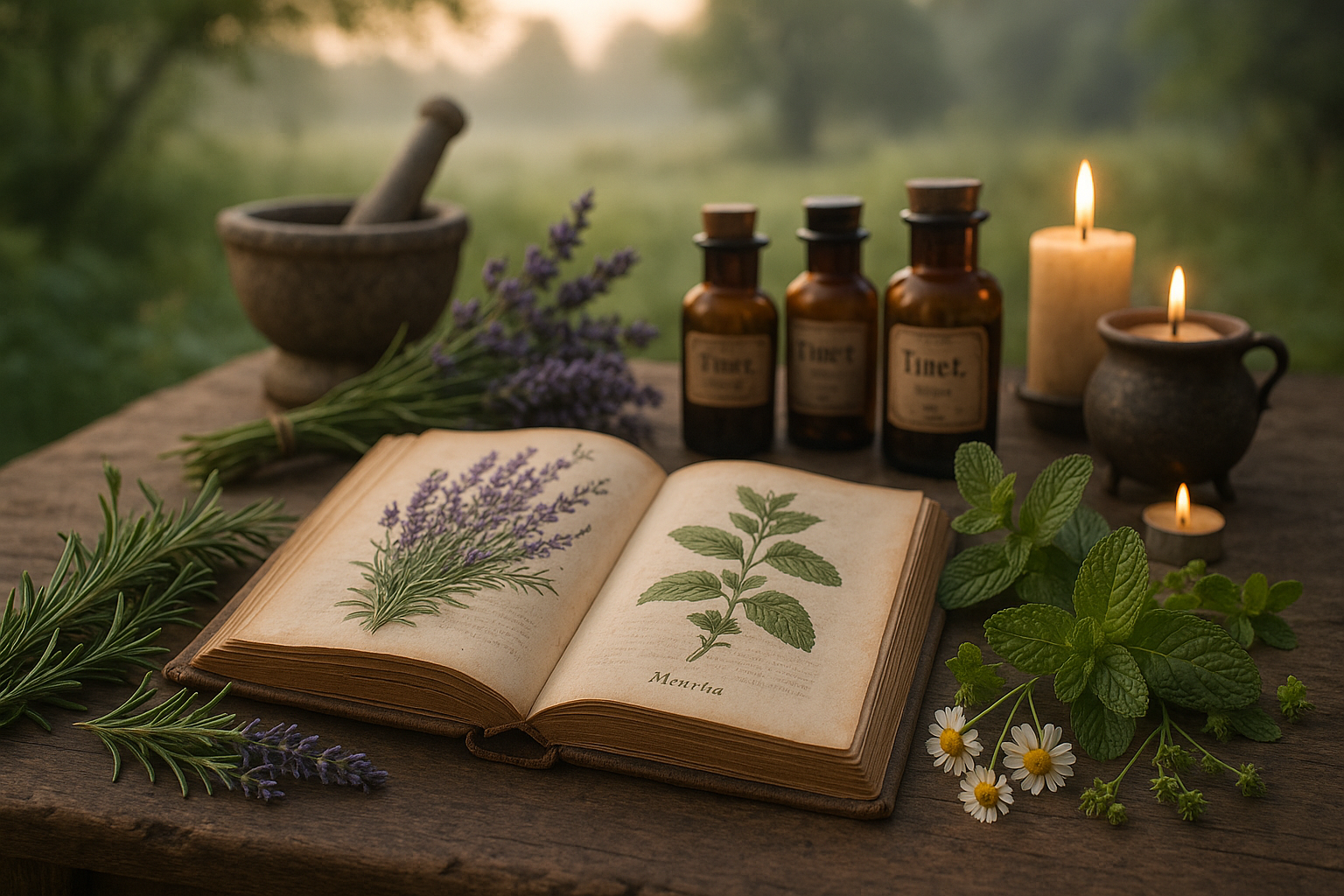Herbs have been an integral part of human history for thousands of years, weaving their way into the fabric of our daily lives through the rich tapestry of ancient medicine. 🌿 From the bustling markets of ancient Egypt to the serene gardens of Chinese emperors, these natural wonders have held a place of reverence and mystery. But what secrets do these humble plants hold? And how have they shaped the course of human health and spirituality?
In our fast-paced modern world, it’s easy to overlook the profound impact that herbs have had on medical practices and cultural rituals. Yet, as we peel back the layers of history, we uncover a treasure trove of knowledge waiting to be rediscovered. This exploration into the symbolism of herbs in ancient medicine not only sheds light on past traditions but also offers valuable insights for contemporary health and wellness.
Throughout centuries, different cultures have imbued herbs with symbolic meanings, attributing them with powers that transcend their physical properties. This symbolic significance often intertwined with the practical uses of herbs, creating a holistic approach to healing that modern medicine is only beginning to appreciate. The ancient Egyptians, for example, saw the blue lotus as a symbol of rebirth and used it in spiritual rituals, while the Greeks revered mint not only for its fragrance but for its ability to “stir the senses” and enhance mental clarity.
Understanding these symbolic connections requires delving into the cultural contexts from which they emerged. Each herb’s story is a fascinating blend of botany, mythology, and philosophy. Take, for instance, the revered ginseng root, often referred to as the “root of life” in traditional Chinese medicine. Its shape, reminiscent of the human form, led to its association with vitality and longevity. This anthropomorphic symbolism reinforced its use as a restorative tonic.
In the pages that follow, we will journey through time and across continents, exploring the ancient world where the power of nature was revered and respected. We will uncover the roles that herbs played not only in healing the body but also in nurturing the mind and spirit. From the Ayurvedic practices of India to the shamanic traditions of the Americas, herbs have been at the heart of a global conversation about health and wellness that continues to this day.
Our exploration will be structured around key themes, each shedding light on a different facet of this intricate relationship between humans and herbs. We will begin by examining the spiritual and religious symbolism of herbs, revealing how these plants served as bridges between the earthly and the divine. Next, we will delve into the practical applications of herbal remedies in ancient medicine, highlighting their enduring efficacy and the science that supports their use today.
We’ll also look at how these ancient practices are being revived in the modern world, as more people turn to natural remedies in search of holistic health solutions. This renaissance in herbal medicine is not just a trend but a reconnection with our ancestral roots, a way to harness the wisdom of the past to address contemporary challenges.
Moreover, we will consider the role of herbs in fostering a deeper connection with nature. In an age where technology often distances us from the natural world, these plants remind us of the interconnectedness of all living things and the healing power that lies within that relationship. 🌱
By the end of this journey, you will not only have a deeper understanding of the historical and cultural significance of herbs but also practical insights into how these ancient traditions can be integrated into your own life. Whether you’re a seasoned herbalist or simply curious about the power of nature, this exploration promises to be both enlightening and inspiring.
So, prepare to unlock the secrets of nature’s pharmacy and discover how the symbolism of herbs in ancient medicine continues to influence our lives today. As we embark on this journey, remember that every leaf, root, and flower has a story to tell—one that speaks of healing, transformation, and the timeless bond between humanity and the natural world. 🍃

Conclusion
Throughout our exploration of ancient medicine, we have uncovered the profound symbolism and significance that herbs held in historical healing practices. These natural remedies were not just utilized for their physical benefits but also carried deep spiritual and cultural meanings. 🌿
The article delved into various herbs, each with its unique story and application in ancient societies. From the revered Lavender for its calming properties to the sacred Sage known for purification, these plants were integral to the medical practices of our ancestors. We also discussed the symbolic meanings that transcended their practical uses, such as Rosemary for remembrance and Chamomile for peace and prosperity.
Understanding these ancient practices provides us with a richer appreciation of how herbal medicine has shaped modern holistic health approaches. The symbolic uses of herbs in ancient times reflect a profound connection to nature and an understanding of the world that transcends mere physical healing. 🌺
Today, as we face a resurgence in the popularity of herbal remedies and holistic health, it is crucial to remember the roots of these practices. By integrating the wisdom of the past with modern scientific advancements, we can unlock the full potential of nature to enhance our well-being. This blend of ancient knowledge and contemporary application underscores the timeless relevance of herbs in medicine.
As you reflect on the insights shared in this article, consider how you might incorporate the symbolic and practical uses of herbs into your life. Whether through cultivating a small herb garden, exploring herbal teas, or researching more about their historical uses, there are countless ways to engage with these natural wonders.
We encourage you to share your thoughts and experiences in the comments below. Have you used any of these herbs in your daily life? What benefits have you noticed? Your stories and insights can inspire others to embark on their journey with these ancient symbols of healing. 💬
Moreover, sharing this article with friends and family can spark meaningful conversations about the enduring legacy of herbal medicine. Let’s spread the knowledge and appreciation for the rich tapestry of wisdom that nature provides. 🌱
For those interested in further research, consider exploring resources such as NCBI and Herbal Safety for reliable information on the historical and modern uses of herbs.
In closing, may this exploration of the symbolism of herbs in ancient medicine inspire you to reconnect with nature and appreciate the intricate relationship between humans and the natural world. As we continue to learn and grow, let us remember the lessons of the past and strive to create a future where the power of nature is fully embraced and celebrated. 🌿✨
You can expand each paragraph by diving deeper into specific herbs, discussing more historical contexts, and including anecdotes or studies that highlight the ongoing relevance of herbal medicine.
Toni Santos is a researcher and practitioner specializing in the study of ancestral healing systems, energetic frameworks of the body, ancient herbal traditions, and sacred operative procedures. Through an interdisciplinary and historically-rooted lens, Toni investigates how humanity has preserved and transmitted knowledge of preventive health, subtle anatomy, plant medicine, and ritual intervention — across cultures, lineages, and sacred traditions. His work is grounded in a fascination with healing not only as physical remedy, but as carriers of hidden wisdom. From ancestral preventive health practices to energetic healing maps and ritual operative techniques, Toni uncovers the visual and symbolic tools through which cultures preserved their relationship with the body, spirit, and plant world. With a background in ethnomedical history and comparative anatomy systems, Toni blends archival research with practical study to reveal how ancient societies used plants, energy, and ceremony to shape health, transmit wisdom, and encode sacred knowledge. As the creative mind behind jirenx.com, Toni curates illustrated frameworks, historical case studies, and symbolic interpretations that revive the deep cultural ties between ancestral medicine, energetic healing, and sacred procedure. His work is a tribute to: The lost healing wisdom of Ancestral Preventive Health Practices The guarded rituals of Energetic Anatomy and Healing Maps The ancient knowledge of Herbal Pharmacology of Antiquity The layered sacred practice of Ritual Surgery and Sacred Operations Whether you're a traditional medicine scholar, energetic healer, or curious seeker of ancestral health wisdom, Toni invites you to explore the hidden roots of sacred medicine — one practice, one map, one ritual at a time.
